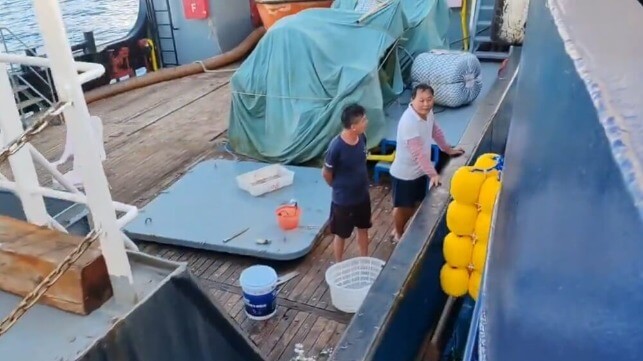WWIII
Chinese Crew "Gravely Threatened" By Collision With Philippine Vessel

On October 11, a Chinese maritime militia vessel made contact with a Philippine fisheries vessel near Thitu Island, causing minor damage to the patrol ship's starboard bow.
"The [maritime militia] vessel 00108 conducted dangerous maneuvers and tried to block the path of BRP Datu Cabaylo. These dangerous maneuvers caused the sideswiping and collision with the BFAR vessel, which sustained minor dents in its starboard bow," the Philippine Bureau of Fisheries and Aquatic Resources (BFAR) said in a statement.
Video from the scene shows that the Chinese government maritime militia trawler 00108 - a large, modern vessel - was overtaking the smaller BFAR patrol ship Datu Cabaylo on the starboard side at a slow bell. The trawler closed to within a few feet, then gently shouldered the fishery vessel's starboard bow, rubbing against a hanging fender.
Four Chinese crewmembers were on deck watching casually, and the video appears to show that they made no attempt to deploy their own fenders or alert their crewmates in the wheelhouse, instead chatting amongst themselves and taking video with their phones. One Chinese crewmember came face-to-face with the crew on the Cabaylo's bow, within conversational speaking distance (below).
Footage taken from aboard the Cabaylo appears to show that the trawler's port quarter also made contact, this time with a metal-to-metal clang. Again, a militia crewmember was on deck and watched the collision unfold without apparent concern.
Under COLREGS, the overtaking vessel is responsible for avoiding a collision until it is past and clear.
Though the Chinese trawler's crew appeared relaxed and unconcerned as they struck the fishery vessel, they were "gravely threatened," according to the Chinese government.
"The truth is that Philippine official vessels sailed dangerously in waters under China’s jurisdiction and collided with a Chinese fishing boat conducting regular operation there," alleged Chinese Foreign Ministry spokeswoman Mao Ning. "The behavior . . . gravely threatens the safety of Chinese fishing boats and crew."
The incident occurred within the western Philippine exclusive economic zone, an area recognized under international law and affirmed by the Permanent Court of Arbitration in the Hague. China claims control over the region under its historically-based "nine dash line" policy, and its maritime forces routinely water-cannon, shoulder and blockade Philippine vessels in the area.
To foreign audiences, China denies the existence of its maritime militia, and it maintains that the well-maintained, modern and commercially inactive trawlers are crewed by Chinese fishermen. To the domestic audience, the maritime militia is openly advertised as an adjunct of the People's Liberation Army, crewed by trained paramilitary forces and used for presence operations.
No comments:
Post a Comment